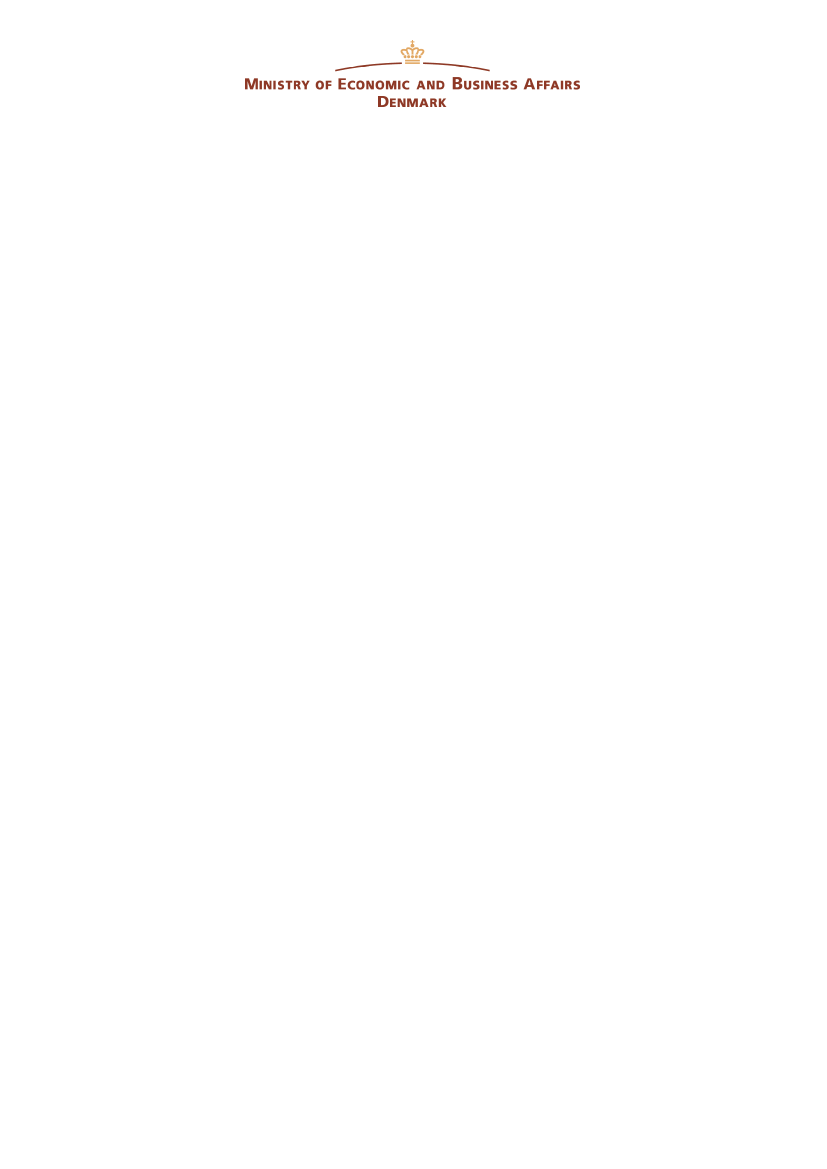Erhvervsudvalget 2010-11 (1. samling)
ERU Alm.del Bilag 139
Offentligt
European Commission, DG Internal Market and ServicesRue Joseph II 591049 BrusselsBelgium[email protected]
MINISTER FOR ECONOMICAND BUSINESS AFFAIRS
Consultation on the Green Paper on expanding the use of e-
Procurement in the EU
MINISTRY OF ECONOMICAND BUSINESS AFFAIRSGeneral Comments
The Danish government welcomes the initiative by the European Com-mission to expand the use of electronic procurement within the EuropeanUnion.The Danish government agrees that e-Procurement has the potential toyield large efficiency gains in the individual purchases, the overall ad-ministration of public procurement and the general functioning of themarkets for government contracts.The Danish government also agrees that expanding the use of e-Procurement will lead to greater accessibility and transparency as a directresult of businesses’ possibilities of on-line screening for opportunitiesand immediate access to tender documentation.E-Procurement will speed up individual procedures and reduce adminis-trative costs for both economic operators and contracting authoritiesalike.Additionally, e-Procurement will promote the integration of EU procure-ment markets due to the reduction of distance barriers, which traditionalpaper based environments are hindered by. E-Procurement has the poten-tial to reduce information gaps, thereby widening the pool of possiblesuppliers and potentially enlarging markets.Despite these significant potential gains of e-Procurement, it is my im-pression that the greatest obstacle to the expanding use of e-Procurementis the perception among contracting authorities and suppliers that e-Procurement entails considerable investments and that the benefits hereofare uncertain.In addition to this, there is a predominant perception among contractingauthorities that there are large technological risks attained to a conversionto e-Procurement, which further hinders expansion of e-Procurement.Slotsholmsgade 10-12DK-1216 Copenhagen K
Tel.Fax
+45 33 92 33 50+45 33 12 37 78
2/2
Specific Comments
The Danish government would like to applaud the Commission for ensur-ing that no obstacles exist within the procurement directives for contract-ing authorities to apply e-Procurement.The Danish government would also like to stress the importance of en-couraging the use of e-Procurement through incentives as opposed to in-troducing legal requirements. Such incentives should be applied in orderto convince contracting authorities to apply e-Procurement. Incentivescould be in the form of further reduced time limits or something entirelynew.It is the opinion of the Danish government that standardisation should bea priority for the European Commission in its efforts to promote e-Procurement. The introduction of standards ensures considerable simpli-fication and cost savings.This standardisation effort should not solely concentrate on e-Procurement platforms. Standardisation of digital signatures in order topromote interoperability must also continue.The Danish government thus supports the Commissions existing effortsregarding standardisation of digital signatures as these efforts promotemore effective e-Procurement systems. These efforts include establishingtrust regarding digital signatures and eID and improving ETSI-standardsamong others. Together these initiatives provide an important step inachieving increased interoperability of digital signatures.Early experience from Danish contracting authorities also implies thatstandards and open source components make an excellent foundation forIT-developers to further develop the best possible technical solutions.Open source solutions saves both time and costs for IT-developers whomuch more easily are able to develop e-Procurement systems and makingthese available for contracting authorities. The immediate goal herebyshould be to increase the supply of digital solutions and thereby competi-tion in order to attain inexpensive prices that small and medium sized en-terprises can afford.The Danish government therefore encourages the Commission to focusits efforts towards the development of standards and open source solu-tions.

